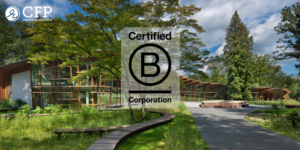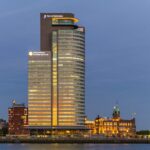

Why investing in Sustainable Real Estate in Canada yields financial value and reduces gigatons of carbon
Sustainable real estate includes commercial and residential real estate property that is designed, built, and operated in a way that minimizes environmental impact. The trend towards sustainability in the real estate industry has been driven by several factors including increasing global awareness of the need to protect the environment, stricter government regulations and the desire to save money on operating costs. Listed below are some of the trends, opportunities, and challenges that currently drive the urge to expand the sustainable real estate offer in Canada.
1. Climate change is a critical issue for the real estate sector
Real estate contributes nearly 40% of global carbon emissions. Climate risk is also an opportunity to create solutions that enhance operation efficiency, generate new revenue, and improve returns and asset values at the same time they reduce environmental impact.
Source: The future of sustainable real estate is smart | Deloitte
2. As the economy decarbonizes, new opportunities arise to create new revenue streams and improve asset values
McKinsey research estimates approximately USD $9.2 trillion in annual investment will be required globally to support the net-zero transition. To be in line with the Paris Agreement to maximize our chances of limiting rising temperatures to 1.5 degrees Celsius, the built environment must aim to cut emissions by 50% by 2030 and be net zero carbon by 2050 at the latest.
Sources: Climate risk and the opportunity for real estate | McKinsey and How the conversation around green real estate is changing | World Economic Forum
3. Energy efficiency and clean buildings policies continue to expand
Building energy codes and standards are in place in only 80 countries, and without further expansion 40% of the expected growth in floor area by 2030 will not be covered by building codes for the whole sector. To align with the Net Zero Scenario, the buildings sector require
all new buildings and retrofits to be zero-carbon-ready by 2030 at the latest.
Source: Buildings sectorial overview | IEA
4. Tenants are demanding healthier and more environmentally sustainable spaces
The COVID-19 pandemic has elevated health and wellness as a key consideration for tenants selecting properties. Tenants now have to “earn the commute” of their employees, so they are seeking to increase productivity and talent retention in a tight labor market through providing smarter green buildings. The World Green Building Council studies show up to 11% productivity gains from improved ventilation, up to 23% productivity gains from improved lighting design, and substantial improvement in employee retention through green retrofits.
Source: The future of sustainable real estate is smart | Deloitte

5. Construction costs and project completion times are rising
In the third quarter of 2022, building construction costs soared to an all-time high in Canada, with costs for residential buildings rising 47.2% since the star of COVID in Q1 2020 and non-residential buildings up 22.6% in the same period.
Source: The future of sustainable real estate is smart | Deloitte
6. Building codes are key enablers of a net-zero buildings sector
Decarbonizing the buildings sector is critical to Canada’s pathway to 2030 and 2050. Emissions in the buildings sector have been trending upwards since 2005 as Canada’s building stock continues to grow. More than 80% of Canada’s building stock will be made up of existing buildings that are still in operation in 2030.
Strong building codes set the baseline for building performance and lock in best practices in construction. The Government of Canada actively works with industry as well as provincial and territorial governments on the development of increasingly stringent, performance based model building codes, including to introduce net zero energy-ready model codes for new construction and the code for retrofits to existing buildings. Wide-scale adoption of these codes will go a long way to improving the performance of Canada’s building stock.
Source: 2030 Emissions Reduction Plan | Environment and Climate Change Canada
7. ESG performance is starting to have a measurable impact
An improvement in ESG performance is starting to show a positive impact on returns and valuation. In 2021, 48% of European real estate companies experienced an increase in valuation when ESG scores increased, compares to only 22% when ESG performance fell. North America was the front-runner in positive ESG performance corresponding to an improvement in returns.
In 2021, 42% of real estate companies there saw an increase in returns when ESG performance rose compared to only 29% when the performance fell. While this demonstrates an increasing alignment between ESG performance and asset returns, it also reveals that
investors in North America and Europe may be starting to give a valuation premium to companies that are performing better on ESG aspects.
Source: The future of sustainable real estate is smart | Deloitte
The GRESB 2022 real estate benchmark has grown significantly over the last years (USD 1bn in 2011 to USD 5bn in 2020), both in terms of fund/firm count and assets under management. In 2023, it includes 1,820 entities participating worldwide, covering USD 6.9 trillion of GAV across 74 countries.
Sources: Sustainability and Private Equity Real Estate Returns | Research
Gate and 2022 Real Estate Assessment Results | GRESB
8. Advances in energy efficiency are key to boosting progress in decoupling energy consumption from floor area growth
Floor area is expected to increase around 20% by 2030 worldwide (more than the whole built floor area of North America). More than 80% of this floor area’s growth is expected to be in emerging and developing economies. At the same time, the building sector energy intensity
needs to drop nearly five times more quickly over the next ten years than it has in the past ten in order to get on track with the Net Zero Scenario. This means the energy consumed per square meter in 2030 must be at least 35% less than in 2021.
Source: Buildings sectorial overview | IEA
Conclusion
In conclusion, sustainable real estate offers many financial and environmental benefits that can be
unlocked through collective efforts. As the real estate industry starts to work toward decarbonization and net-zero goals, parallel endeavors need to be aligned to create standardized policies, foster sustainable investments, create awareness, comply with international frameworks, and manage ESG risks.
Materializing the opportunities present in sustainable real estate could allow different stakeholders to improve the valuation and returns of portfolios and, to create new revenue streams, while reducing the industry’s environmental and social impact.
Get started today!
Would you like to learn more about trends, opportunities and challenges in sustainable real estate in Canada? We are here to help. Get in touch or read more about how our Green Buildings Tool can help you create financial and environmental value.






